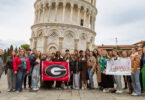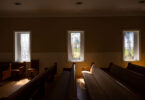During the Centennial Closing Reception at the State Botanical Garden Conservatory last month, Dean Andy Horne encouraged more than 100 faculty, staff, alumni and friends of the College of Education to look ahead to the next 100 years and envision how the college can lead Georgia in rethinking education.
The event closed the year-long celebration of the college’s 100th year and was attended by senior administrators and deans, former deans of the college, retired faculty and alumni award winners.
The college kicked off its centennial with a luncheon last June and has celebrated throughout the year. “Education in Georgia: First Annual State of the State Report,” a conference for Georgia’s education leaders, was held in October.
Several departments hosted speaker series, one featuring Craig D. Weidemann, vice president for Outreach at Pennsylvania State University, and another the internationally known researcher and writer on creativity, Arthur J. Cropley.
A new Centennial Terrace was dedicated in September. Located on the Carlton Street entrance to Aderhold Hall, the terrace features more than 450 brick pavers personalized with inscriptions from faculty, staff, alumni and friends of the college. COE alumna Mary Frances Early, UGA’s first African-American graduate, gave the invocation. Contributions to the Centennial Terrace support the endowed Centennial Scholarship which has raised more than $35,000 to date.
At the closing reception, Horne also recognized the 2009 Centennial Scholarship recipients, Toni Deanon and Regina Suriel. The $1,000 scholarships-one to an undergraduate and one to a graduate student-were first given at the centennial kickoff luncheon a year ago.
Deanon, of Montezuma, is a senior majoring in middle school education. She is specializing in social studies and language arts and is working on getting her certification in teaching English for Speakers of Other Languages. After graduation, she plans to work with Teach For America to gain experience in the most needed schools and to help students who need her help the most.
Suriel, a fourth-year doctoral student in science education, spent eight years teaching in New York City’s multicultural public schools. She wants to study the acquisition of scientific literacy among Latino English language learners or ELLs.
“Latino ELLs are lagging behind in basic reading, mathematics and scientific literacy, as compared to their English-speaking peers. Both teachers and students will need to learn new strategies for coping with new social and learning dynamics resulting from the rapid influx of students of Latino origin,” she said. “The solution will likely contain a set of defined best practices that include ways to relate to and teach Latino ELLs. My goal is to develop much-needed multicultural science materials for Georgia’s secondary students.”







